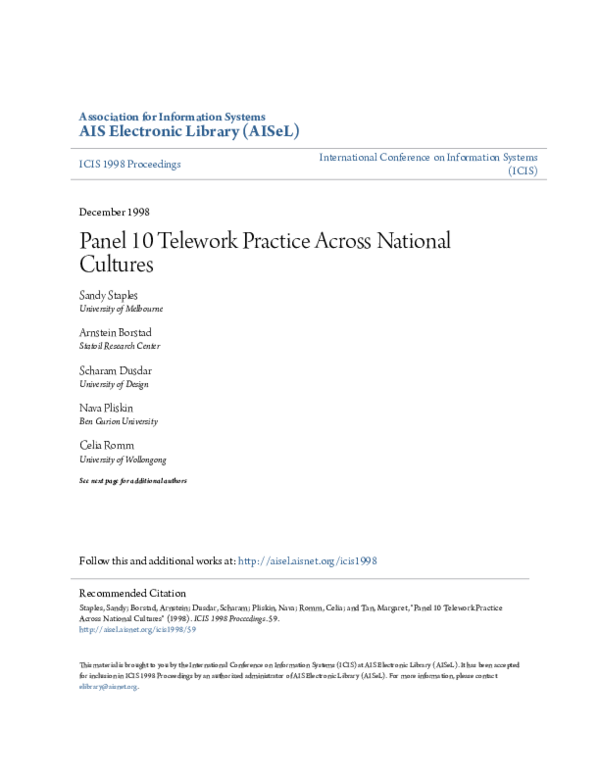Academia.edu no longer supports Internet Explorer.
To browse Academia.edu and the wider internet faster and more securely, please take a few seconds to upgrade your browser.
Panel 10 Telework Practice Across National Cultures
Related Papers
1- Different types of teleworking and their organizational outcomes 2- Reasons of the increasing tendency towards teleworking both for employees and organizations 3- Definition and function of flexibility with regard to teleworking 4- Effects of teleworking on employee performance in line with job satisfaction, work-family life balance (WFL) and organizational competition 5- Perceived advantages and disadvantages of teleworking both for employees and organizations 6- Ways to improve employee performance and telework management strategies.
The Cambridge handbook of technology and employee behavior (pp. 511-543)
Telework: Outcomes and Facilitators for Employees2019 •
This chapter reviews current research on telework. We first examine the literature on telework and job performance, job attitudes, and professional isolation, before reviewing the outcomes of telework on employee well-being as characterized by stress and work-life balance. We then turn our attention to factors that contribute to a successful telework experience: characteristics of the job, characteristics of the employee, and characteristics of the employee's manager(s). We also identify the key role of technology support in influencing many of the established outcomes of and contributors to telework. Finally, we discuss the gaps in our knowledge of telework's repercussions for employees and organizations. We conclude by identifying the implications of what we do know for theory and practice. To maximize positive outcomes, we recommend evidence-based guidelines for organizations with regard to 1) selecting and preparing employees for telework, and 2) managing their use of this flexible work practice.
Journal of Management …
Teleworking: Frameworks for Organizational Research2002 •
Teleworking is a work practice that entails remote working for at least some of the time. Common arrangements include work done at home or in the field, by teleworkers in a range of occupations. As such, telework is one of the most radical departures from standard working conditions in the suite of flexible work practices now gaining widespread acceptance. In this paper, we develop an explanatory model of organizational adoption of teleworking. We do this as a means of integrating the current literature on the incidence of teleworking and to provide a theoretical grounding and framework for understanding differentials in the growth of teleworking in different organizations, industries and countries. We begin by developing an appropriate framework for conceptualizing teleworking. We propose a multivariate approach that is able to differentiate the various forms of teleworking. We then use this framework to develop a model and a series of propositions concerning the adoption of different forms of teleworking. Neo-institutional theory, as well as recent empirical evidence on teleworking informs this model.
Group Decision and Negotiation
Toward a telework taxonomy and test for suitability: A synthesis of the literature1995 •
European Conference on Information Systems 2014 (ECIS 2014)
Telework and the Nature of Work: An Assessment of Different Aspects of Work and the Role of TechnologyEngagement in work through information and communication technology from places other than a corporate office, often referred to as telework, is simultaneously transforming work and life. In order to support successful adoption of telework by organizations it is important to move away from re- search stacking up evidence for or against telework. Instead what is required is a more nuanced ex- amination that seeks to contribute to better understanding of work practices and the support for suc- cessful approaches to telework. Based on an analysis of an extensive online debate following Yahoo’s decision to ban telework, we identify important issues associated with telework in practice and con- trast them with their presence in extant literature. This leads to the identification of areas for research that should be further advanced to support organizations in improving their telework practices. In particular such research can be built on a more thorough assessment of teamwork and collaboration needs, as well as the nature of work that is to be undertaken by teleworkers.
RELATED PAPERS
A ordem internacional assimétrica e a reforma da ONU: uma perspectiva histórica
1455) A ordem internacional assimétrica e a reforma da ONU: uma perspectiva histórica (2005)2005 •
Debating evolution in context – religion in the biology classroom – Brazil, England and the United States.
Debating Evolution in Context -Religion in the Biology Classroom2023 •
2014 •
Revista IBRACON de Estruturas e Materiais
Numerical analysis of piled rafts with short bored piles2022 •
AAVV, Nel sottosopra degli anni Ottanta, Bologna, Machina Libro
Linee di fuga Gli anni Ottanta il riflusso e i movimenti2024 •
IOP Conference Series: Earth and Environmental Science
Parameters of crushing process of fibrous plant raw material: experimental results2021 •
The Handbook of South American Archaeology
The Prehistory of Venezuela – Not Necessarily an Intermediate Area
 Sandy Staples
Sandy Staples